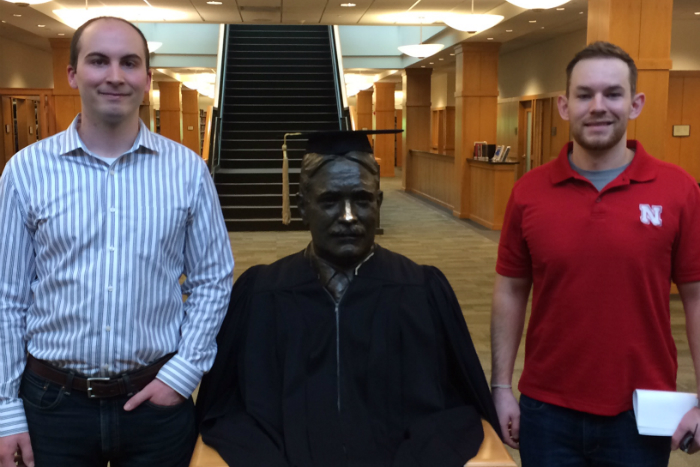
Federal regulations governing securities-based crowdfunding will become effective later this month. Two graduating law students at UNL’s Entrepreneurship Legal Clinic are advising startups to proceed with caution.
“Any brand new regulation, when it doesn’t have a lot of guidance like this does, is sort of like the Wild West,” said James Burton from Omaha, one of the E-Clinic’s consulting law students. “The stakes are high for equity, and if you mislead people either intentionally or unintentionally, you may have to pay back everyone’s money.”
Will Beyers, another consulting student from Loveland, Colorado, sees reward-based crowdfunding like Kickstarter to be relatively unregulated as well, but with much lower risk.
“What’s governing Kickstarter? Basically nothing,” Beyers said. “But I doubt someone would hire a lawyer and sue over a t-shirt.”
BECOME A SPONSOR
Join us in championing the narrative of success, resilience, and ingenuity that defines Nebraska’s startup community. Learn more »
Beyers and Burton recently gave a presentation on both securities-based and rewards-based crowdfunding at FUSE Coworking. The presentation, called “Kickstart Smarts,” covered the positives and negatives of crowdfunding.
“Rewards-based crowdfunding can be excellent for a small business with a clear-cut idea, on their way to establishing a product,” Beyers said. “But it wasn’t popular in the early years because people didn’t know what to expect. Securities-based crowdfunding is there now.”
“Most attorneys we talk to are taking a wait and see approach,” Burton said. “Compliance may be difficult, and you don’t want to be the guinea pig.”
Crowdfunding will eclipse traditional venture capital
In 2015, according to crowdfunder.com, crowdfunding overtook angel investing for total amount of startup funding, and is rapidly closing in on the total for venture capital.
“There are a bunch of funding portals and broker/dealers lining up to launch on May 16,” Burton said. “Where it goes from here depends on the type of business and people’s risk tolerance.”
There are some consumer protections built into the federal regulations, including strict limits on the amount an individual can invest based on their income and net worth. But beyond that, Burton and Beyers see little guidance from the feds.
“With more established ways of selling securities, people know exactly what the requirements are,” Burton said. “But selling securities through crowdfunding is so new that there is very little guidance about what’s acceptable and what’s not.”
State-level crowdfunding laws remain unused
The legal framework for rewards-based crowdfunding is also rather undefined.
“Basically it’s regulated through state consumer protection acts and federal contract law,” Beyers said. “It’s a patchwork of things at this point. We don’t really know how the law will come down if there’s an issue.”
Beyers said that rewards-based platforms like Kickstarter are sometimes used as much for marketing as they are for fundraising.
“Some people use it as almost an advertising platform,” he said. “People with millions may still use it for the exposure.”
The 2014 Nebraska Legislature enacted a state-level securities crowdfunding law, but to this point it appears to be collecting dust.
“Many state programs, including Nebraska’s, are going unused,” Burton said. “The SEC took longer than everybody expected with their regulations, but now they’re in place.”
Europe, particularly Germany, is a little further down the track with equity crowdfunding and may provide some insights.
“It’s certainly a place to look,” Beyers said. “Nothing’s gone crazy so far.”
In the near term, Burton and Beyers recommend using more established ways to sell securities that are well understood.
“You need to take an in-depth look at what you’re trying to do and where,” Beyers said.
The UNL Entrepreneur Legal Clinic, established in 2013, uses supervised law students to provide free advice and legal representation to startup businesses throughout the state. Under Nebraska Supreme Court rules, law students are allowed to provide direct client representation under the supervision of a licensed attorney.
—
Rod Armstrong is Vice President of Strategic Partnerships for AIM in Lincoln, Nebraska. He is a regular contributor to Silicon Prairie News.




One response to “UNL’s E-Clinic on the Wild West of securities-based crowdfunding”
Nebraska has a crowdfunding law and regulations in place. To date, no company has utilized the option.